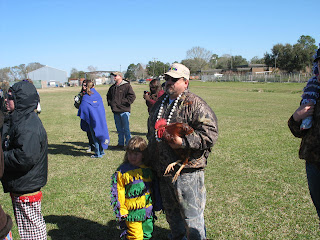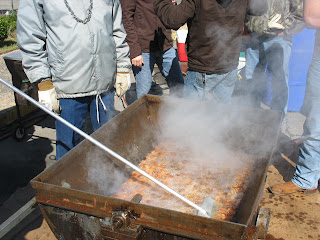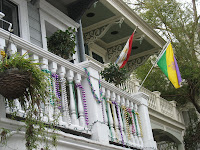 From there we followed along the backroads stopping at several homes where someone would release a chicken for their gumbo. What craziness!
From there we followed along the backroads stopping at several homes where someone would release a chicken for their gumbo. What craziness! They always gather and sing to the property owner, in French of course, and then after they catch the chicken they dance and beg for cinq sous or 5 cents. If you don't donate you might find your shoe gone.
They always gather and sing to the property owner, in French of course, and then after they catch the chicken they dance and beg for cinq sous or 5 cents. If you don't donate you might find your shoe gone.

Bands and food were everywhere so we drove over to Iota to eat jambalaya, alligator, and boudin for lunch at their Mardi Gras celebration. A band was playing and people dancing as is typical with plenty of food and some crafts on had. Leon had a couple of vegetarian corn dogs in his pocket. He must have been the only vegetarian in Louisiana.
We went back to Eunice, set our chairs out and listened to music while we watched the masses mingle and wait for the courir participants to parade through town. They arrived and threw beads to the crowd as they paraded down the streets. They were no longer allowed to ride standing on their horses and they complied.

I even decided to don a new hat for the festive occasion as did Leon.

Dinner at D I's, eight miles south of Basile was a treat. The restaurant began when D I Fruge cooked crawfish from his 40 acre crawfish farm in his barn. He expanded twice after that and people come from miles around to have a meal in the middle of nowhere. We were quite surprised when the Tee-Mamou mardi gras came in to entertain the crowd on the dance floor. There is some sort of tradition where they all get hit with the bull whip and wrestle with the capitaines before begging for money from the crowd. All in fun, of course. It was the perfect way to end a fantastic day and two magnificent weeks in Louisiana. We have enjoyed all of your comments. Thanks for taking the time to read our blog. Time to head back on Wednesday to the dead end. I think it will probably also be a fat Wednesday, Thursday, Friday. But I sure had some fine cajun food: jambalaya, boudin, alligator, crawfish, shrimp, gumbo, boudin balls, mache choux, beignets, catfish, crawfish etouffee, oyster poboy, and crawfish cakes.

 We stumbled across a new rv park on the outskirts of town - Lakeview Park & Beach - and when we went to investigate were invited to stay as is the cajun way. They had a band playing and had started a boucherie earlier in the day. One guy was cooking a large pot of cracklins. He even pointed out the pig's ear!
We stumbled across a new rv park on the outskirts of town - Lakeview Park & Beach - and when we went to investigate were invited to stay as is the cajun way. They had a band playing and had started a boucherie earlier in the day. One guy was cooking a large pot of cracklins. He even pointed out the pig's ear!
 It was quite interesting to watch them stuff the boudin. One tourist commented that she heard they no longer use intestines for the casing but the cajun replied, "yeah, we do."
It was quite interesting to watch them stuff the boudin. One tourist commented that she heard they no longer use intestines for the casing but the cajun replied, "yeah, we do." 










 I thought it was interesting that the sheriff stopped to play his accordion while in uniform. Must have been taking a little music break!
I thought it was interesting that the sheriff stopped to play his accordion while in uniform. Must have been taking a little music break!


 The Jambalaya band played in their Mardi Gras costumes while Dr. Barry Ancelet from the Jean Lafitte Center narrated, mostly in French. The dance floor was filled with talented dancers.
The Jambalaya band played in their Mardi Gras costumes while Dr. Barry Ancelet from the Jean Lafitte Center narrated, mostly in French. The dance floor was filled with talented dancers.






 The pavillion in the Abita Springs park was designed for the Mississippi exhibit of the World's Industrial and Cotton Centennial Exposition of 1884 in New Orleans. After the exposition the pavillion was taken apart and reassembled in 1888 to cover the then famous free flowing spring.
The pavillion in the Abita Springs park was designed for the Mississippi exhibit of the World's Industrial and Cotton Centennial Exposition of 1884 in New Orleans. After the exposition the pavillion was taken apart and reassembled in 1888 to cover the then famous free flowing spring.


















